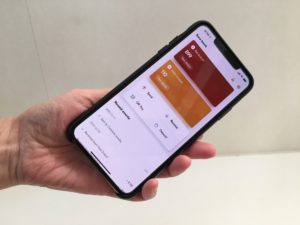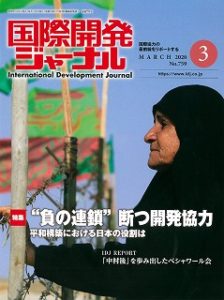Digital Currency using Blockchain technology introduced in Cambodia
picture:Checking balance with the dedicated application ©SORAMITSU CO., LTD.
IDJ ENGLISH
『International Development Journal』2020 February edition
Innovation and Development Special
Assisted by a Japanese venture company
In recent years, digital currencies using blockchain technology have been the subject of a great deal of discussion in global financial markets. The upshot of this attention has been a rush for organizations, companies and countries to take advantage of growing opportunities in this space. Perhaps the highest profile example of this came in June 2019, when American social media giant Facebook announced plans to issue its own digital currency, called “Libra.” Another example came in April 2017, when the central bank of Cambodia (also known as the National Bank of Cambodia: NBC), and Japanese venture company Soramitsu Co., Ltd., signed a joint development of digital currencies agreement. It was at this point that development of a blockchain-based national currency in Cambodia began.
Blockchain, also known as “distributed ledger technology,” is a mechanism for continuously recording and managing transaction data, also known as blocks. The main advantage of blockchain technology is that, because data is stored in thousands of devices on a distributed network of nodes, the system and the data are resistant to technical failures and malicious attacks. The digital currency planned by Soramitsu and the NBC is the first attempt by a central bank to utilize blockchain technology, and its development is being watched closely around the world.
World standard technology developed
Soramitsu Co., Ltd. was founded in 2016 with the ultimate goal of creating a blockchain that covers the entire world.
According to Soramitsu’s Director, Kazumasa Miyazawa, the company decided to focus on blockchain because, despite promising technologies which were already available, these technologies still faced various operational problems. For example, conventional techniques had a low processing speed, allowed stored data to be accessed far too easily, and did not provide sufficient privacy management. Furthermore, programs were relatively difficult to use. Most used a complex programming language, meaning that only a select group of top engineers were able to develop them.
Another reason Soramitsu developed blockchain technology centres around the Linux Foundation’s launch of the Hyperledger Project in 2016. This project aimed to create a global standard for blockchain. Soramitsu first participated in the project in May of 2016 and was selected as one of the winning entities from about 290 companies in October of the same year. In May 2019 it released “Hyperledger Iroha 1.0” as a commercial version.
The blockchain developed by Soramitsu overcomes many of the problems inherent in digital currency. Specifically, in addition to the high speed and large capacity of its blockchain, access to Soramitsu’s product is limited to specific people, and privacy is protected. Furthermore, development using the blockchain can be easily performed by anyone with even low-level computer programming skills.
At present, Soramitsu uses its own blockchain technology to conduct business in Japan and overseas. In Japan, it is developing a digital regional currency in cooperation with the city of Aizuwakamatsu. Outside of Japan, the Moscow Exchange Group also uses a blockchain on settlement, custody and transfer. However, the development of a digital currency in Cambodia continues to be the company’s biggest international project.
Changing the nature of economic transactions
The joint venture between Soramitsu and the NBC came together relatively quickly for a project of its size and scope. In January 2017 the NBC became aware that Soramitsu was developing a global standard for blockchain, and offered to bid on the joint development of digital currencies. The joint development agreement was signed by the two parties about three months after the beginning of discussions, providing evidence that the NBC was serious about the project. After selection, a new digital currency, named Bakong, was developed in cooperation with the bank, and in July 2019, a test operation using Hyperledger Iroha was completed. If the test ultimately proves successful, it is expected to be officially introduced in early 2020.
Bakong has the potential to dramatically change economic transactions in Cambodia. First, Bakong has value, just like cash. Second, users experience no time lag in the Bakong system because the currency arrives immediately after payment. This is a major advantage, because when processing a transaction through a bank, there is normally a time lag between the moment of payment and the actual payment being processed. The Bakong system eliminates this delay. Transactions are also free of charge. The system is also flexible, as payments can be made both using the local currency of Cambodia (the riel) and the US dollar. In addition, remittances can be sent easily; the payer only needs to know the phone number of the other party or scan the QR code displayed on their smartphone.
Miyazawa says one of the main reasons the NBC decided to introduce a digital currency was “attempting financial inclusion.” In Cambodia, only about 20% of the population has a bank account, and about 80% of Cambodians have no means of settlement other than cash payment. On the other hand, smartphone penetration is said to be 150%. By downloading the Bakong application via smartphone, 16 million Cambodian citizens will potentially be able to send money to anyone using a method other than cash. The technology is also expected to increase the number of bank accounts because, while standard Bakong transactions are limited to $250 per day, having a bank account removes such restrictions. In addition, people who need the convenience of online transactions will be encouraged to open bank accounts for larger transactions or business purposes.
According to Miyazawa, “currency strengthening” is another reason the NBC decided to introduce a digital currency. In recent years, the possible introduction of a digital Chinese yuan and Facebook’s Libra have been discussed in international financial markets. If such well-known digital currencies are introduced first, the NBC fears a decrease in the use of the Cambodian riel. By introducing Bakong now, Soramitsu and the NBC hope to mitigate both potential concerns.
2020: a Potential Landmark Year for Blockchain
Another major reason Soramitsu decided to work with the NBC in the development of cryptocurrencies was an experience Miyazawa had during a previous project. Prior to joining Soramitsu, he worked for the Sony Group and was one of the core members of the launch of electronic currency called “Edy” (now Rakuten Edy). Miyazawa now looks back on his time with Sony as a bitter lesson learned. As with the introduction of credit cards, he has helped develop a mechanism to process payment and then send money later. In this case, even if a small store sells something, there is a time lag until payment is made, and the next purchase cannot be made. The development of Bakong applies this lesson by allowing users to settle and remit payment immediately.
Miyazawa predicts that “2020 will be a milestone year for blockchain, as blockchain utilization is progressing around the world”. With the wave of digitization currently occurring in financial and currency markets around the globe, Japan, which has a lot of cash settlements, may need to follow this trend. (Keitaro Fukushima)
*****以下、日本語原文*****
ブロックチェーンを用いたデジタル通貨を導入
日本のベンチャー企業が協力
米フェイスブックがデジタル通貨「リブラ」の発行を計画するなど、近年、デジタル通貨が大きな注目を集めている。2017年4月には、カンボジア国立銀行(中央銀行)と日本のベンチャー企業がブロックチェーンの技術を活用したデジタル通貨の共同開発に調印し、国家レベルでの動きも始まった。
ブロックチェーンは「分散型台帳技術」とも呼ばれ、取引のデータ(ブロック)を連続して記録・管理する仕組みのことだ。複数の管理者が複数のコンピューターでデータを管理し、データの改ざんができなくなるといった利点を有している。カンボジア中銀が計画するデジタル通貨の発行は、一国の中央銀行がブロックチェーンの技術を活用して行うという点で世界初の試みであり、成否に注目が集まっている。
世界標準の技術を開発
カンボジア中銀とデジタル通貨の共同開発に調印したのがソラミツ(株)だ。「そらみつ」とは万葉集で登場する「大和の国」の枕詞で、「大和の国を空が満たす」という意味だ。「世界中を覆うようなブロックチェーンを作りたい」という願いの下、2016年2月に万葉集から社名を命名する形で同社は設立された。
ソラミツの宮沢和正特別顧問によると、同社がブロックチェーンに着目したのは今後、期待できる技術にもかかわらず、依然として、運用面でさまざまな問題点を抱えていたからだ。例えば、今までの技術であると、処理速度が遅い上、保管されているデータへのアクセスが容易であり、プライバシー管理が十分でなかった。さらに特殊な言語を使うなどプログラムが難しく、一部の優秀なエンジニアしか開発ができず、なかなか普及が進まないのが実情であった。
こうした状況で渡りに船だったのは、2016年にリナックス・ファウンデーションが「ハイパーレジャー・プロジェクト」を立ち上げたことだ。このプロジェクトはブロックチェーンの世界標準を作ることを目指すもので、同年5月にソラミツも参画した。同年10月に約290社の中から開発事業体の一つとして選定された後、2年半にわたる開発を続け、2019年5月に商用バージョンとして、「ハイパーレジャーいろは1.0」を発表するに至った。
ソラミツが開発したブロックチェーンは今まで指摘されていた課題をすべて克服するもので、安心して利用できる技術だ。具体的には高速大容量となったのに加え、アクセスは特定の人だけに限られ、プライバシーは保護されている。その上、一般的なプログラム開発ができる人であれば、簡単に利用できるようになっている。
現在、ソラミツは自社が持つブロックチェーンの技術を用いて、国内外で事業を展開している。国内では会津若松市と連携して、デジタル地域通貨を開発中だ。国外では、モスクワ証券取引所グループにおける決済および証券保管・振替(保振)のブロックチェーン化を手掛けている。そして、同社最大の海外案件となっているのが冒頭で紹介したカンボジアにおけるデジタル通貨の共同開発だ。
経済取引のあり方を変える
カンボジア中銀との共同事業は実にスピーディーだ。ソラミツがブロックチェーンの世界標準を開発していると知ったカンボジア中銀がデジタル通貨の共同開発に向けた入札参加を持ちかけたのは2017年1月のことだ。それから3カ月ほどで共同開発に調印しており、カンボジア中銀の本気度が垣間見える。選定後は同行とデジタル通貨「バコン」を開発し、19年7月にはハイパーレジャーいろはを活用したテスト運用に漕ぎ着けた。上手く行けば、20年の早期を目途に正式に導入される見込みだ。
デジタル通貨「バコン」は、カンボジアにおける経済取引を劇的に変えうる特徴を有している。まずバコンはそれ自体が現金と同等の価値を持ち、送金が可能だ。通常、銀行を介した取引であると、入金を指示するタイミングと実際の入金までにタイムラグがあるが、バコンは支払ったタイミングですぐに相手先に到達するため、取引完了までのタイムラグがない。そして取引は手数料無料で行える。これらは自国通貨リエルと米ドル建てで可能だ。さらに送金は相手の電話番号が分かれば、またはスマホに表示されたQRコードをスキャンさえすれば、容易にできる。
それでは何故、カンボジア中銀はデジタル通貨を導入する決断に至ったのか。宮沢特別顧問は背景の一つに「金融包摂の試み」を指摘する。カンボジアでは国民の銀行口座の開設率が2割程度と低く、8割程度が現金支払い以外の決済手段を有していなかった。他方、スマートフォンの普及率は150%と言われる。スマートフォンにバコンのアプリをダウンロードすれば、計算上、1,600万人のカンボジア全国民は誰でも決済・送金できるようになり、決済手段が増える。そして銀行口座開設率の向上にもつながると期待されている。バコンを使った取引は一日250ドルに制限されているが、銀行口座を持てば、そのような制限はなくなる。オンライン上での取引に利便性を感じた国民がビジネス目的も視野に、より多額の取引をしようと銀行口座を開設するよう仕向けるということだ。
続けて、宮沢氏はもう一つの背景に「自国通貨の強化」を挙げる。昨今、国際金融市場では中国のデジタル人民元やリブラが話題になっている。このような利便性の高いデジタル通貨が先に導入されてしまえば、「自国通貨が利用されなくなる恐れがある」と、カンボジア中銀は危機感を抱いていたという。今回、バコンを導入したのは、そうなる前に先手を打つという意図があったと、宮沢氏は続ける。
今年はブロックチェーン元年に
実はソラミツが仮想通貨の開発に協力する背景の一つに、宮沢氏が前のプロジェクトで経験した思いがある。以前はソニーグループに勤務し、電子マネー「Edy」(現在の楽天Edy)の立ち上げに中心的なメンバーの一人として加わった。その宮沢氏が今、苦い教訓として振り返るのは、クレジットカードと同様に後日にまとめて入金する仕組みにしてしまったことだ。これでは販売しても、入金までにタイムラグがあり、小規模店舗では次の仕入れができない。この教訓を生かして、バコンでは即時に決済・送金がされるようにした。
宮沢氏は、「2020年は世界各国でブロックチェーンの活用が進み、“ブロックチェーン元年”という節目の年となる」と予想する。金融・通貨市場にもデジタル化の波が押し寄せる中、旧態依然とした現金決済が多い日本も変化に対応していく必要があるのではないか。
本誌編集部・福島 勁太郎
『国際開発ジャーナル』2020年2月号掲載記事





